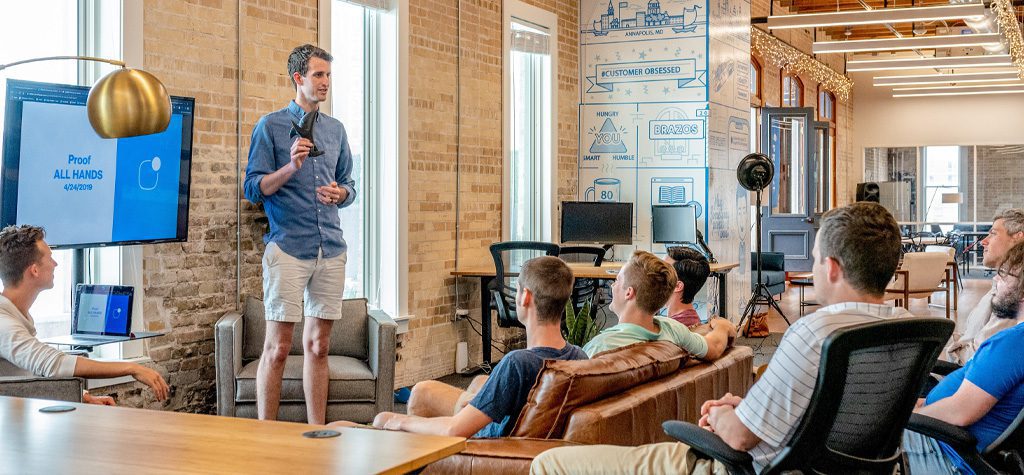In the UK alone, 672,890 companies were incorporated during the 2018/19 tax year – that’s more than one new company every minute. Even ignoring the portion of those companies that decide to work exclusively from home, that means there are hundreds of thousands of opportunities for office operators to attract new business, every year.
But to attract those companies to your office property or flexible workspace, you need to meet their needs. New companies come in many forms, but for the purposes of this article, I’m going to talk about ‘startups’. I characterise these businesses as recently founded SMEs that prioritise agility, rapid growth, and minimal overheads. As a classic startup example, think of the early days of Amazon and Facebook.
These companies have a unique set of criteria, which means an office space that’s perfect for startups is often very different to one that suits a more traditional business. Whether you’re looking to attract new business to a coworking space or a traditional private lease office, here’s how to nail those criteria and create a space that works for your target market.
- Identify the needs of startup businesses
Before you can build an offering that will attract startups, you need to know what the owners of these businesses are looking for. Over my twenty years in the industry I’ve seen trends come and go, but some features seem to consistently appeal to new, high-growth companies:
- Startups often offer employee benefits such as flexible working hours, which obviously necessitates flexible office opening times. It’s also not uncommon for employees to work long hours, sometimes late into the night, as they push for rapid growth during the pivotal early years. 24/7 access throughout the year meets both of those needs.
- The size of a startup business’ workforce can change at breakneck speed which means that owners need an adaptable workplace. Offering flexible space arrangements and payment terms that can scale with businesses will ensure that prospective occupiers feel confident that your space will be able to meet their ever-changing demands.
- Creativity is key in a business which is still finding its feet and dealing with new problems daily. Having an inspiring space in which to work helps stimulate that creativity, as well as being nice to look at. Creating a space that inspires people can come as a direct result of an effective placemaking project.
- Creating a space that encourages socialisation and culture-building within occupying businesses is critical if you’re trying to attract startups. These businesses thrive off seamless communication channels and strong culture, so facilitate it how you can.
- Design the space
Designing a flexible workspace isn’t all feng shui and colour palettes, there’s actually a lot more that goes into designing a functional office space than you might expect, which ACI highlights.
Think about what is needed from the space and optimise the layout with this in mind. Break-out areas for blowing off steam, private meeting rooms of varying size, and a hot desking area will all likely be popular with startups, giving them flexibility.
It’s also a good idea to strongly consider an open plan layout. Collaboration is key to productivity in so many businesses, and having desks separated by cubicles or too many walled-off offices can hinder this.
When it comes to decoration and styling, offices are like houses in that prospective occupiers will be influenced by what they see when they first walk through the door. Modern interior design will add an aspirational edge to your offering, so it could be worth enlisting the help of an interior designer or placemaking specialist. If that’s not an option, there are plenty of resources available online to guide you.
If you’re working with a traditional private lease office, it’s likely your occupier will want to put their own mark on it. Make sure your space is flexible so startups, who often do things a little differently, can arrange it how they’d like, whether that’s painting the walls neon green or installing a ping pong table.
- Build a lifestyle
Simplicity and ease of use are incredibly desirable elements of an office to startups, whose employees often work long hours and can struggle to maintain a work/life balance. Just as business owners don’t want to faff around with admin when they’re busy thinking of ways to become profitable, their employees don’t want to waste time walking around, looking for a place for lunch, or going to buy a coffee.
The solution is to focus on creating a lifestyle for your occupiers. Imagine every way in which you can help their working day be as streamlined as possible, and consequently help them get the most out of their time in your space. Some features that I’ve seen work attracting startups are:
- Access to food and drink on-site in the form of a chic café or bar
- Discounted gym membership, whether the gym is on-site or local
- Hospitality packages with discounts on local independent businesses
- Meet up and networking events that give occupiers a chance to unwind and meet their neighbours
- Price flexibility so that occupiers can just use the office when they need it
- No long lease to provide peace of mind to occupiers
Remember – just like when you’re designing and positioning an office space to suit any other market – consider your occupiers’ needs, design the space accordingly, and build a lifestyle that works for them. Armed with these suggestions, there’s no reason why you shouldn’t be able to build the perfect office for startups and attract exciting occupiers who never want to leave.

